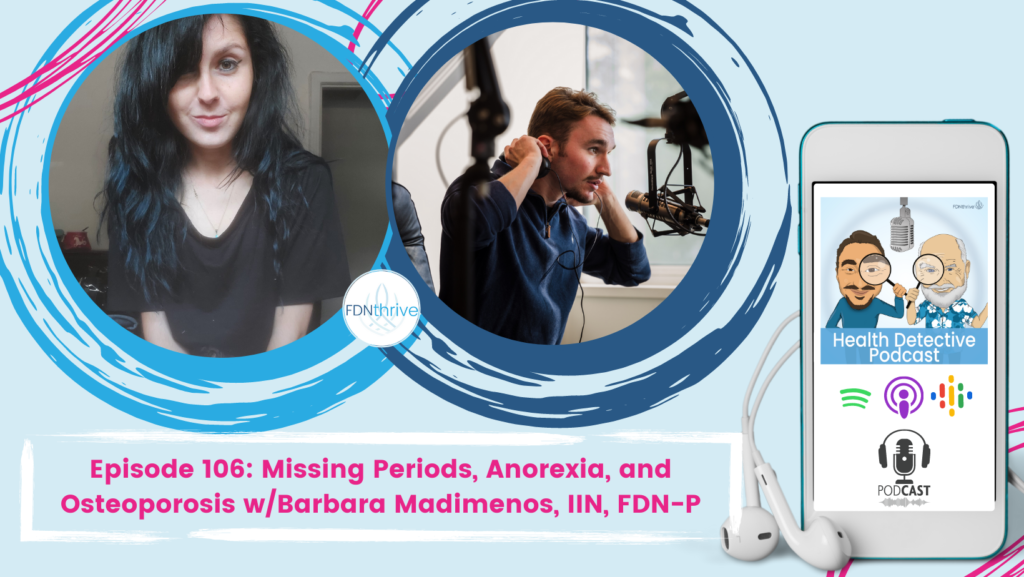
We’re going to talk about a few different things today: anorexia nervosa, an eating disorder, osteoporosis, and the fact that Barbara ended up losing her period at only 14 years old.
Now, anorexia is not something we’ve ever covered on here. We’ve covered bulimia and that was about it in the realm of eating disorders. Then outside of that, there’s been nothing. The reason I’m going in on this for a second is because I’m someone that you guys know is in the mental health space. I am here largely because of mental health issues that I did deal with that led me to FDN eventually.
Anorexia: Eating Disorder Stigma
I say this exact thing in the podcast, but to me, it’s important enough to reiterate in the beginning here. I think there is a lot of confusion and stigma still around mental health conditions. I think this can be even more true with certain mental health conditions. I think the eating disorder one is hard for people to understand.
I think other things like schizophrenia, bipolar are hard for people to understand, not that we talk about those two today. But nonetheless, I’m trying to group those in altogether in the sense that there is a societal confusion with these things. I, even as someone who has been through this, I cannot sit here and honestly state that I don’t understand why stigma exists, why there is confusion around this. I get it. I really do get it.

What I always like to tell people though, and “like” is not the correct word, anorexia nervosa is the mental health condition out of every single one of the other mental health conditions out there, (There are quite a few in the DSM, which is, if you don’t know, the diagnostic and statistical manual. It’s how professionals diagnose mental health conditions.) the number one mental health condition most associated with fatalities. It kills more people than any other mental health condition, in the sense of percentages. I’m not really sure, don’t quote me on that. I’m not sure if it’s the most overall, but it is the highest one in terms of percentages, that I do know.
Guys, this is a real thing. This isn’t an attention seeking thing. This isn’t something that people do for fun because they’re bored. I don’t think you end up dying from something this universally the way that it’s happening with so many people from attention seeking. I really want to believe that the people on this podcast don’t have this same level of ignorance around any physical health issue or mental health issue, but there’s always one. I’ve been doing this long enough to know that there’s always one.

So, I encourage everyone always to go in with an open mind when we’re talking about mental health or physical health, because even some physical health issues can sound pretty extreme for some. Just know that these are real people that go through real things, man. Educate yourself. Why don’t you look it up?
Why don’t you study it a little bit? You might find that someone that you know has these types of conditions and you didn’t even realize it because of the societal lens that you have. I’m not here to give a whole lecture about that. I’m just saying this is an important topic and these are real things. Even if you don’t understand it, it’s still real for someone else and can greatly affect their life to the point of ending up in the hospital multiple times as was the case for Barbara.
Barbara’s Background
A little bit about her. She is a functional health coach located in Montreal, Quebec, with a focus on women’s metabolic and endocrine disorders. How she ended up working in this space with this specialty all started when she was just thirteen years old and was diagnosed with anorexia.

In the midst of her disorder, she also developed severe hormonal imbalances, such as amenorrhea (amenorrhea is the loss of a menstrual cycle), hypothyroidism, anxiety, alcohol and drug abuse, as well as self-harm coping mechanisms. This all led her down a pretty deep hole. Finally, in October of 2018, she was diagnosed with osteoporosis and at the end of her rope, she decided to try and recover on her own by educating herself on the foundations of what it is to heal metabolically.
Today, at the age of 28, she has successfully recovered, and she’s passionate about educating women on doing the same thing that she did through a food first approach with lifestyle and supplemental modifications. Well, Barbara is a heck of a trooper. It’s a heck of a story, and we were so glad to have her on.
Introduction
Detective Ev: Without further ado, let’s get to the episode. Alright, Miss Barbara Madimenos, thanks so much for being here with us today. We’re glad to have you.
[00:06:07] Barbara: Thank you. Thanks for having me.
[00:06:08] Detective Ev: It has been a long time coming to get her on the podcast here. Very busy woman. I’m really excited too, because this is the first interview that I’ve done with the new mic.
So, we will start off in the same place that we usually do on this podcast. That is just as simple as, where did this health journey begin? And what I mean by that specifically is, when did the health symptoms for Barbara start and what did those look like?
[00:06:50] Barbara: First of all, I can definitely hear a really great voice from you with your new microphone, so happy for you.
Barbara Tells Her Story
Well, my story is pretty long, but in short, my health journey started actually when I was around thirteen years old. That’s when I actually developed an eating disorder. It lasted for close to a little over fifteen years. I’m twenty-eight now. It’s been a while, but what happened in the middle of it was that I actually ended up losing my period, I think at the age of fourteen.
I was in and out of hospitals for most of my life because of my eating disorder and anxiety and all that. It came to a point that in my later years where I realized that my period just never came back, even though I had been weight restored a couple of times, and I lost weight again.

When I wanted to take my health more seriously and start trying to recover, the period thing was the biggest issue. Back in 2018, I actually ended up in the hospital again because I broke my hip, surprisingly. That’s when I was diagnosed with osteoporosis and I was like, I really got to get things undergoing. I got to take things a lot more seriously, and I realized that my osteoporosis was intertwined with my hormonal issues, my no-period.
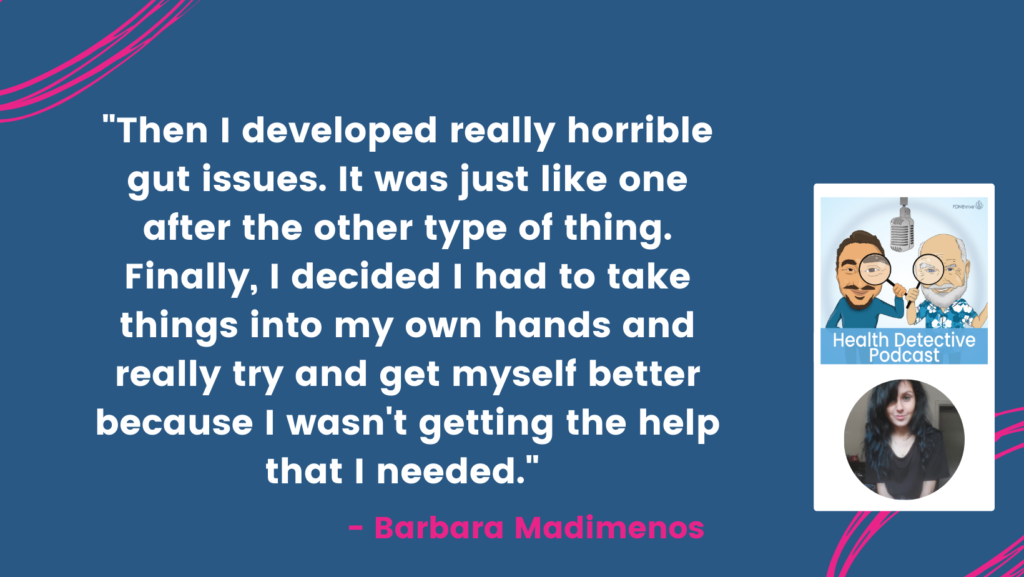
Then I developed really horrible gut issues. It was just like one after the other type of thing. Finally, I decided I had to take things into my own hands and really try and get myself better because I wasn’t getting the help that I needed. And we did it in the end. Here we are today.
[00:08:26] Detective Ev: So, there’s a lot to already dive into there because for those that listen regularly. And thankfully we do have a lot of regular listeners now that like to just get all these stories in different perspectives, then you already know I had a long history with the mental health side of things.
I think it might be easier for someone to connect the whole anxiety or depression thing, at least in today’s world and climate, to functional medicine or natural health. I think the farther away we go from those, the harder it is to connect. We might not necessarily be able to see what functional medicine and natural health do for an eating disorder. So, I’m curious about that.
Weight Restoration
But even before that, there was a term that you used which I’ve never heard this before. I’m already kind of thinking that this is a medical procedure. I think you called it “weight restoration.” Is that something that’s done for people who are dealing with certain eating disorders?

[00:09:12] Barbara: Yeah, my eating disorder that I was dealing with was anorexia. I was severely underweight. In times in which this is like a medical emergency where somebody is almost emaciated, the first line of intervention is really to weight restore them, before they start developing things like organ failure. So, because I was in and out of hospitals many times when I was younger, I had to go in and out of hospitals for weight restoration cause I continued to lose weight.
[00:09:44] Detective Ev: Wow! I’m very familiar with the spectrum of eating disorders, but I’ve never heard that term.
It seemed intuitive to me. I’m like, okay, is this really because this person has become so underweight that they need to do that? That’s intense. That is absolutely intense. I don’t think we would ever need to justify this on this podcast, but as someone who, I know both of us directly and indirectly are mental health advocates in one way or another. I actually talk about anorexia to some degree, a decent amount, because I think maybe anxiety and depression are doing a little better in terms of stigma, but I feel like everything else is still just as bad as it’s ever been.
Anorexia: Shocking Realities
Guys, anorexia is the mental health condition, out of all the mental health conditions, most associated with fatalities. This is a very real thing. This absolutely affects people severely. Again, probably not something I need to say on a podcast like this. I think people are more well-versed, but I do know how hard it is for those individuals who haven’t dealt with mental health issues to comprehend that these are real. A panic attack is a real experience, depression is a real experience, eating disorders, schizophrenia, bipolar, whatever it might be.
At thirteen, when this is starting, and I know that maybe there’s more to this that you figured out nutritionally or whatever down the road, from your interpretation, what was triggering this at thirteen? Is this completely just something that you were predisposed to? Was this a societal thing? Because I know both of those things are shouted at some times as being causes for this. What’s your perspective on why this may have started manifesting at thirteen?
[00:11:11] Barbara: Yeah. What’s funny is that this was never a societal thing. I was not heavily influenced by the media or anything like that.
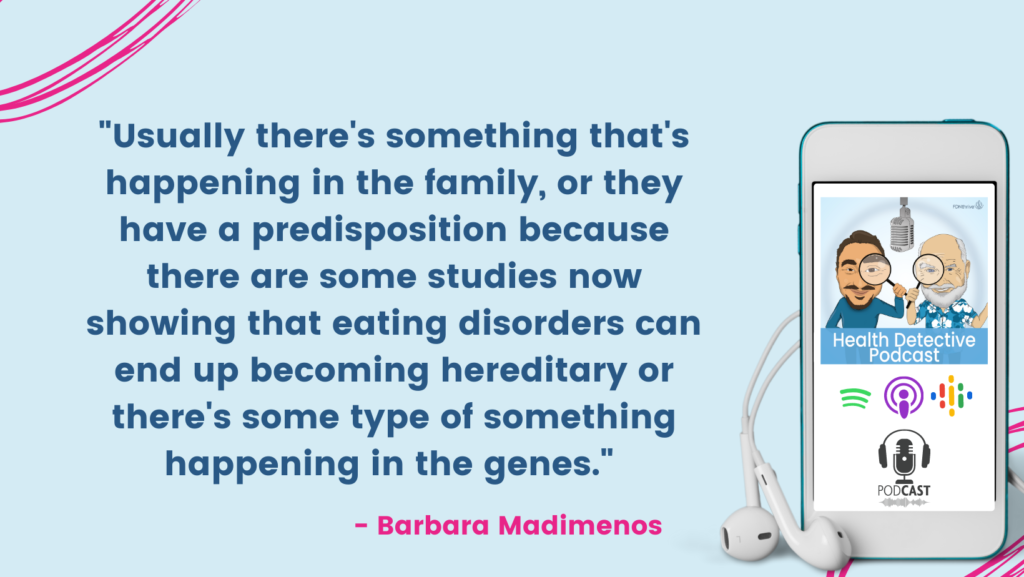
I think most people who do end up developing an eating disorder, that is not the forefront or rather the main influences, what causes them to react in such a way and develop it. Usually there’s something that’s happening in the family, or they have a predisposition because there are some studies now showing that eating disorders can end up becoming hereditary or there’s some type of something happening in the genes.
I know I have an aunt who had an eating disorder. I have a couple of cousins who’ve had eating disorders and I do also see a bit of it in just how my direct family may have some food issues. Not that I lived in a diet heavy household, it’s just people were focused on their appearance.
But I was also a very anxious, I had a low self-esteem when I was a kid. I just don’t know where that came from necessarily. I’ve always been like that and throw in my parents’ divorce and then you have a recipe for disaster.
[00:12:15] Detective Ev: Sure. I appreciate someone who’s dealt with this, having that perspective, because I do think society impacts us all.
I mean, there’s no doubt about that. It’s always just figuring out to what degree does this matter in general. What degree does it matter for individuals in specific circumstances? We’re wired to care what other people think and to compare ourselves to other people. At one time, this was probably useful in tribal days when there was very limited people, you’re comparing yourself to others in the tribes to see who’s doing the best.

You try to be like them for survival. Just like so many mechanisms that were useful thousands of years ago that aren’t useful now, our brains are wired in this way and social media abuses it, magazines abuse it, advertisements abuse it. We don’t necessarily need to be comparing ourselves to other people, certainly not in the way that we’re wired to in today’s world.
We’re not in these tribal days, most of us, so it’s not necessary and it’s being abused. But in your case, this is what I find interesting. You’re not even necessarily saying society was a huge part of this, if it played any role at all.
I do find that interesting because I’ve never understood how societal influence can take someone to the point of needing something like weight restoration. I understand how this could influence someone’s food choices at the restaurant, but that seems pretty extreme, certainly extreme enough that I don’t understand how these eating disorders would be so prevalent.
I think we need to be looking at this in a different way, as a legitimate, real mental health condition that comes from, or at least in part, from somewhere else other than just society. Let’s do better as a society, yes. But let’s also look at what else is going on with these individuals. That kind of leads me to my next question.
Well, I guess even before we get to the natural stuff, I am curious because you said you got to this point where you had to take your health into your own hands. That is so true for virtually everyone that comes onto this podcast. I mean, what was being done for you over all? If we can ask this, were medications being given, was counseling recommended, like what was being done that didn’t work well enough that you were eventually led to doing this to yourself?
Independent Health Search
[00:14:16] Barbara: So, funny, not funny, but I was a very, very difficult patient. I think a lot of people who, especially when you don’t want the help, you’re very resistant to treatments. Many people who do suffer with eating disorders, the whole notion of disorder is that it almost becomes your identity. You start feeling like being, not just the sick one, but the thin one, the small one, the one who’s in control of everything, but really, you’re not in control of much. It becomes you and you develop this fear in losing it.
Yeah, I was in and out of treatment. I mean, I was in the hospital maybe three times, outpatient, four times. I think I’ve seen every type of professional you can imagine psychologist, psychotherapist, psychiatrist, a regular therapist, you name it, that I just never really meshed with them.

I never liked the way that they approached it. They never took an individualistic approach with me. It was a very cookie cutter approach. Yes, medication was offered to me a couple of times, but it was never necessarily for the benefit of me.

I do remember sitting down in the mental ward and I had a psychotherapist approach me. I think he was a psychotherapist or a psychiatrist. I don’t quite remember, but he approached me, and he said, I want to give you these antidepressants because you’re so difficult to handle. I told him, I’m like, you’re going to give me pills just because I have an opinion on things. He said, well, you’re just too difficult to speak to and I can’t control you.
Detective Ev: Wow!
Barbara: Yeah, so that turned me off. Anyways, once I left the medical system at eighteen, you’re considered an adult here in Quebec, I left, and I ended up losing more weight. I ended up even worse, but I didn’t feel comfortable seeking the help that I had gotten from the medical system.
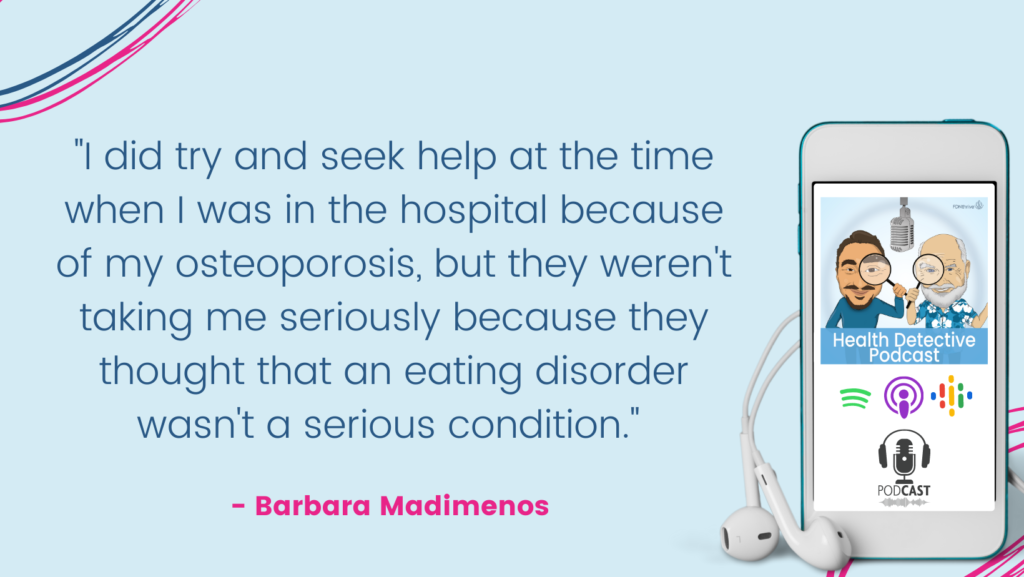
Then once I broke my hip, I realized, okay, this is it. I can’t continue to starve myself or anything because now my bones are so brittle. I’m at the end of my rope. I did try and seek help at the time when I was in the hospital because of my osteoporosis, but they weren’t taking me seriously because they thought that an eating disorder wasn’t a serious condition.
Granted I was in a regular hospital, I wasn’t in a mental word or anything. So, they didn’t under quite understand what it was. You know, when you’re at rock bottom, I think something just clicks. You go into a survival mode and you’re like, okay. I just, I have to do this by myself. You know, I think it was just the right time and the right mindset. I was ready to recover, and I just did it.
[00:16:52] Detective Ev: Sorry, this triggered another question for me, and I’ll stop at this one and then we’ll get into more of the natural stuff, because I’m just so curious. But I feel like it’s very, very different from mental health issue to mental health issue.
I know you outside of this, highly intelligent person, well-read; and mental health conditions can still take over the minds of even the most intelligent individuals. It doesn’t really matter. What is the perspective of someone that’s dealing with anorexia when, and I know that body dysmorphia can be a huge thing, certainly at some point, especially with these diagnoses of the osteoporosis and stuff, you have to realize, I’m assuming, and I could be assuming incorrectly, that the body is failing, this isn’t working, whatever, then still we’re continuing to calorie restrict?
Usually, people like this engage in rigorous exercise that’s not appropriate, right? Everyone should exercise, but it’s not appropriate at the time. Can I ask, what is the mindset going on at these times? What are you thinking as Barbara, when you know that this isn’t working, but the actions continue? What’s the thought process there?
Cyclical Patterns
[00:17:56] Barbara: I think it’s this fear of not being enough. If I were to stop these idiosyncrasies, it was, if you’re not enough, then you have to continue to minimize yourself, that this was the only thing that I felt I had control over in my life and the only thing that I felt like I was good at.

I didn’t know if I had an identity outside of my disorder. I was so used to punishing myself. I’m not sure if I mentioned this before, but I had developed other things as well. I developed the binge drinking for a couple of years during my teenage years. I was also addicted to painkillers, at some point. I also played with self-harm at some point as well. That took like maybe last year was my last year of self-harm for me. It was really a journey, to say the least. I think this whole point of repeating these patterns, even though that you know that you’re hurting yourself, you don’t know how else to handle yourself because you don’t know how to love yourself. You don’t know how to care for yourself because you’re so used to hating yourself. It’s like this cycle.
[00:19:00] Detective Ev: Thank you for that answer, because I feel like this is not only important for people that are out there that are going to relate to this, but also our audience typically, not always, but typically, is more middle-aged.
So, I’m assuming a lot of these people have kids and they might be seeing some of these symptoms going on. I think one of the best things that we could ever do, regardless of the mental health issue, is allow people that are watching this from the outside to truly get a perspective of what it’s like, and everyone’s different, but what it’s like to that person who’s dealing with it.
Because I’ll never forget, there was people that loved me that when I started talking about, hey, you know what, I’m actually dealing with major depressive disorder, they meant this respectfully, they weren’t being rude, but they would be like, oh, well you’re not depressed, you still go out with friends.
The societal perspective on mental health issues and what they should mean and what they don’t mean is ridiculous. So, I think that’s a powerful answer and it really helps people out. You get to this point, you’re like, okay, I need to do something different. I’m ready to do this. I realize, hey, I might need to do this by myself. Where the heck do you even begin to start this journey of taking things into control? Are you reading books? Are you studying stuff online? Where did that begin?
Enter the Natural Space
[00:20:06] Barbara: So, I was dabbling and “trying to recover,” quote/unquote, for many years, but I kept failing because I wasn’t serious enough over it.
But what I feel like started me, I was constantly trying to break this fear down with food. What initially started me kind of going into like this whole natural space was trying to figure out what can I eat for things to benefit me with the symptoms that I was experiencing.
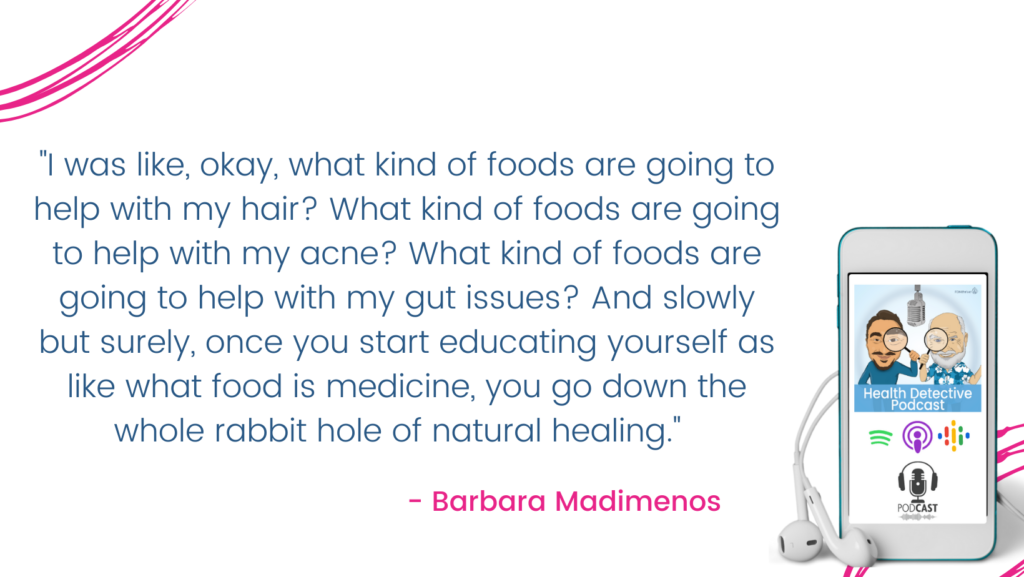
At the time I was dealing with severe hair loss, sometimes some acne, lack of energy, fatigue. I was like, okay, what kind of foods are going to help with my hair? What kind of foods are going to help with my acne? What kind of foods are going to help with my gut issues? And slowly but surely, once you start educating yourself as like what food is medicine, you go down the whole rabbit hole of natural healing.
[00:20:53] Detective Ev: Yeah, absolutely. It’s a pretty deep rabbit hole. I’m still like wandering down here for sure.
But, okay. Then what was the first win that you got where you’re like, hey, this is actually working, this is moving in the right direction? Because I’m assuming, in your position at that time, simply eating anything and doing that on a consistent basis is probably super beneficial.
So, maybe it was that, maybe it was something else. When did things start really moving in the right direction? You’re like, okay, I’m onto something here because usually the first thing, or even things that we try in the natural space, yes, that’s not going to be the resolution to everything we’ve ever dealt with, but there is a moment where we’re like, wow! For me, it was switching to all organic for thirty days, and I’ve maintained that for a while now. But that first thirty days I saw such a dramatic change in my health that I was like, okay, I’m not perfect, but I’m onto something here. What was that moment for you?
[00:21:40] Barbara: Well, I think because I was also simultaneously dealing with a lot of anxiety, I was also reading up a lot on herbs as well.

So, I started playing around with adaptogens to see if there was something that could help balance my mood so I wouldn’t feel so low and relapse again. I started playing with ashwagandha, holy basil, Rhodiola, things like that, mushrooms. I realized that my mood was so much more stable in such a drastic way that I was like this is not normal. I haven’t had a panic attack in a month, how is this possible? I started really going more into herbs and stuff. Then I went down the whole rabbit hole on supplements and all that. How you could basically support yourself, not just your mood through herbs but also food.
Then I started going into the gut microbiome and why I was dealing with digestive issues and all that. You go down the whole thing.
[00:22:37] Detective Ev: Well, and I think that’s really cool because supplements are usually by definition, supplemental. But in a position when someone’s body is probably pretty malnourished, I feel like they can have an even extra effect, because you’re getting stuff that you just really, really need and simply don’t have at that time.
I know that it wasn’t for the same reasons, but I ate a lot of junk food. That was kinda my thing, so I was malnourished in a different way. When I started using a multivitamin as well, that was technically even before the thirty days of organic, to be honest. That was one of the first things that really made me start thinking about this because I noticed my mental health was getting better and nothing had ever moved the needle for my mental health at all. So, I was like, wow, this is cool. I’m onto something here.
IIN and FDN
How did this lead to eventually, because I know that even before FDN, I believe you did the Institute of Integrative Nutrition, right? Was that kind of the first time that you did a certification involving something like this?
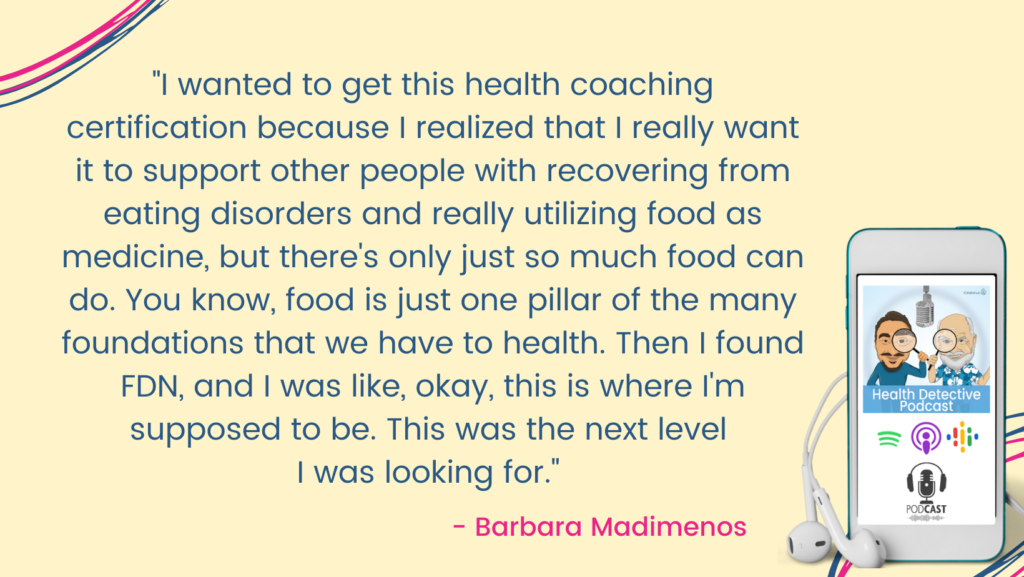
[00:23:29] Barbara: Yeah, that was actually right in the middle of whether I was trying to decide whether I wanted to get better or not. I wanted to get this health coaching certification because I realized that I really want it to support other people with recovering from eating disorders and really utilizing food as medicine, but there’s only just so much food can do. You know, food is just one pillar of the many foundations that we have to health. Then I found FDN, and I was like, okay, this is where I’m supposed to be. This was the next level I was looking for.
[00:24:01] Detective Ev: As someone who did both in that order as well, IIN is really great for the emotional stuff, coaching or whatever.
FDN, there’s really no doubt about it at the time of recording, this is astronomically a more technical, more scientific, there’s just a lot of information for people that are really looking to dive deep. But I think, especially in the position that you were at, IIN was probably great. IIN worked well for me in certain ways, too, with the position that I was in when I went through.

When you were going through FDN though, you had the luxury of getting to utilize some lab tests on yourself and really figuring out what was going on. Especially, I feel like the hormone one was probably particularly insightful for you. Do you recall some of the things that you found on the labs? Because for those that don’t know, just to give some context, so outside of FDNthrive, obviously we have FDN practitioners on – people that go through our course certification program. When you go through that, you have to do all the coursework too, but you do get some labs to run on yourself. That’s what we’re referring to here. What did you find on those that were maybe notable that you’re like, Woe?
[00:25:00] Barbara: I don’t remember everything, but I do remember when taking, I think the adrenal stress profile, my cortisol would always shoot up in the afternoon, which I found very interesting.
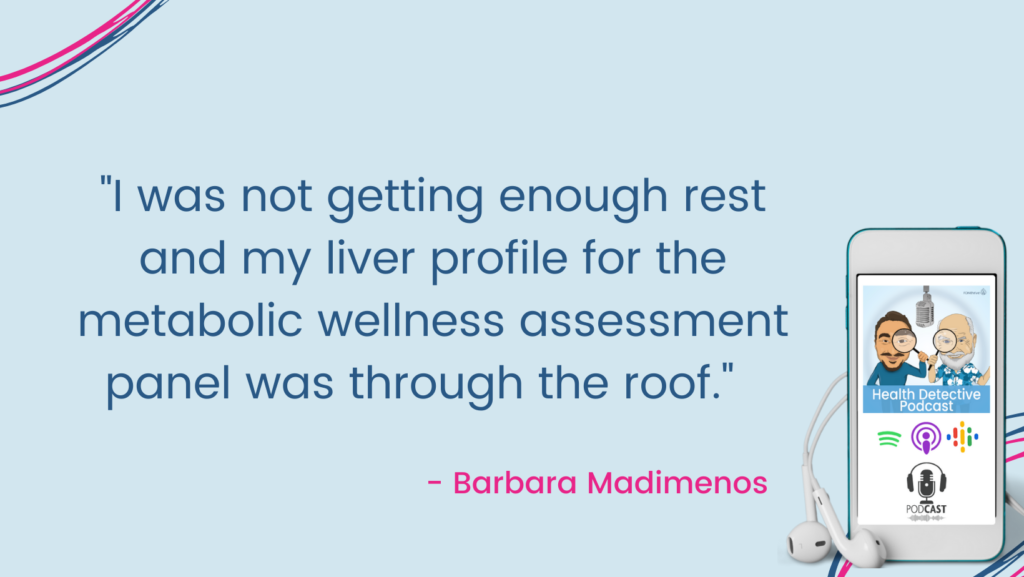
And I think it is because my body was just so acutely stressed just from what I would do during the day. I was not getting enough rest and my liver profile for the metabolic wellness assessment panel was through the roof. I don’t remember who I had as a mentor who was reviewing my labs, but she was like, that’s really high.

And I’m like, that does look really high. Is that normal? She’s like, no. This does not look normal. Then I realized that my liver was really overtaxed and it’s probably because I wasn’t eating enough carbs. It was just overburdened. I was just not providing my body with enough energy to just function and that directly affects your thyroid and so many other things. You really have to get going. The liver is like my favorite organ. I could talk about it all day, but yeah.
[00:26:02] Detective Ev: Yeah. That’s what we love about people on this show. We’re people that have favorite organs. Not everyone in this world has a favorite organ, if you ask them. Or they would give like a really generic answer, like, oh, the heart or something, but that’s great. We’re glad that the liver’s your favorite organ. I’ll start making that a regular question on here.
When you were going through the FDN process, then getting to utilize some of the stuff, these of course, not only do you get the test results, you’re getting to implement certain things where I feel like you got into this relatively early compared to most people on their healing journey. Sometimes it takes them a decade or two to find FDN, but it sounds like from the time that you were trying to get better truly, to the time you found this was probably under a decade, which is great.
So, I feel like the improvements would have been more notable. What did you find was happening in a good way, in the positive direction, as you were going through the course and kind of maybe utilizing some protocols that were based off these lab results?
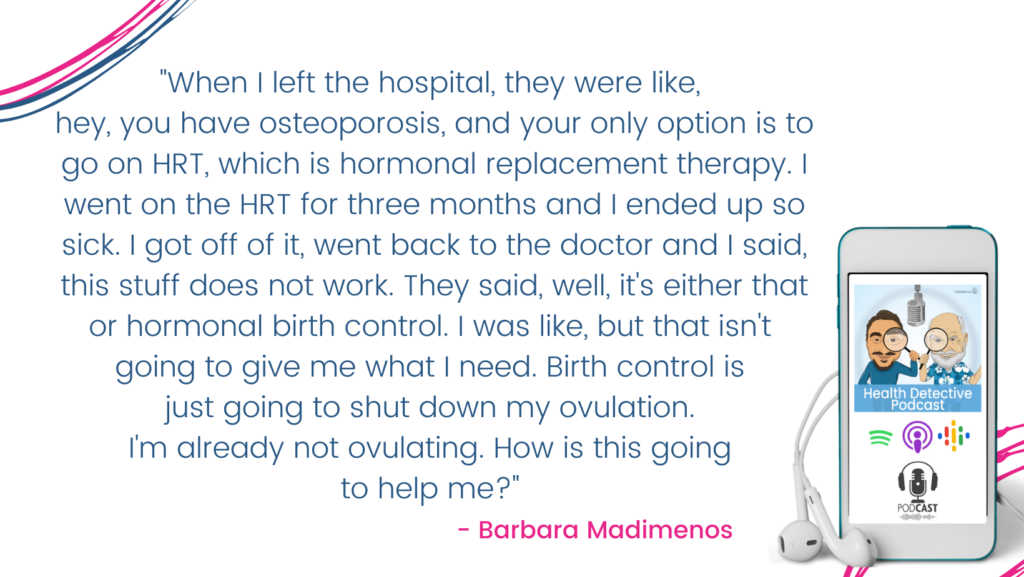
[00:26:53] Barbara: Yes, you’re right. I was really learning this very early during my healing journey. The reason was because I wasn’t getting any help from the hospital. When I left the hospital, they were like, hey, you have osteoporosis, and your only option is to go on HRT, which is hormonal replacement therapy. I went on the HRT for three months and I ended up so sick. I got off of it, went back to the doctor and I said, this stuff does not work. They said, well, it’s either that or hormonal birth control. I was like, but that isn’t going to give me what I need. Birth control is just going to shut down my ovulation. I’m already not ovulating. How is this going to help me?
So, when I was going through the course and I was learning about the hormones and all that, it really helped me understand what needs to be done or what are the correct levels of hormones that I should be looking out for and how I should work on elevating my hormones to those levels?

Because I was pretty much non-existent, my body was just shut down. I learned about the different types of stressors and what I should be doing to help relieve that stress off of my body. Slowly but surely things started looking up because I was working at the foundations first and foremost, such as the D.R.E.S.S. protocol that we learn.
Period Parties
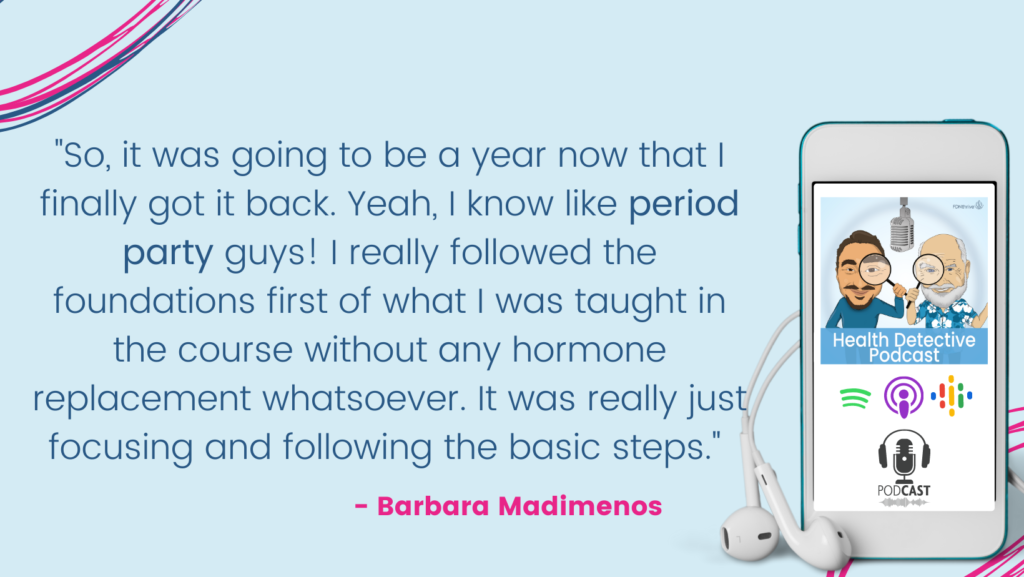
I, when did I get my period? Last January. So, it was going to be a year now that I finally got it back. Yeah, I know like period party guys! This is what I did. I really followed the foundations first of what I was taught in the course without any hormone replacement whatsoever. It was really just focusing and following the basic steps.
[00:28:25] Detective Ev: Well, first of all, congratulations, because that is awesome. Being in a similar age range to you, where we’re only a couple of years apart, I find that on social media I have a lot of friends that were from high school or people that went to college and destroyed their bodies and then they reach out to me and it’s unbelievable because they’re not coming for this reason. But they’ll talk to me about, hey, I don’t have a period or whatever. I don’t have a cycle. I’m like, oh my goodness. They’re like, oh, well, it’s not that big of a deal, my friends don’t either.

I’m like, oh my goodness. This is not good. We should be having these period parties, as you say, where we try to get everyone good and healthy again, because twenty-something year old women folks should not be lacking a period. That doesn’t make any sense biologically, and the fact that this has been normalized amongst the million other crazy health things that have been normalized, this is not okay.
That is one of the most basic natural functions of a female body. I don’t know how we’ve gotten so far away from what is actually normal, that we can think that this is okay or appropriate. But I’m sure you’re probably seeing this all the time with women that you talk to.
What percentage of women that you’re talking to, would you say have these kinds of issues? Or how about this? It’s not even just the loss of a period, what percentage of women would you say come to you and have some type of abnormality in their cycle?
[00:29:41] Barbara: Every single one.
[00:29:42] Detective Ev: Yeah. This is scary.
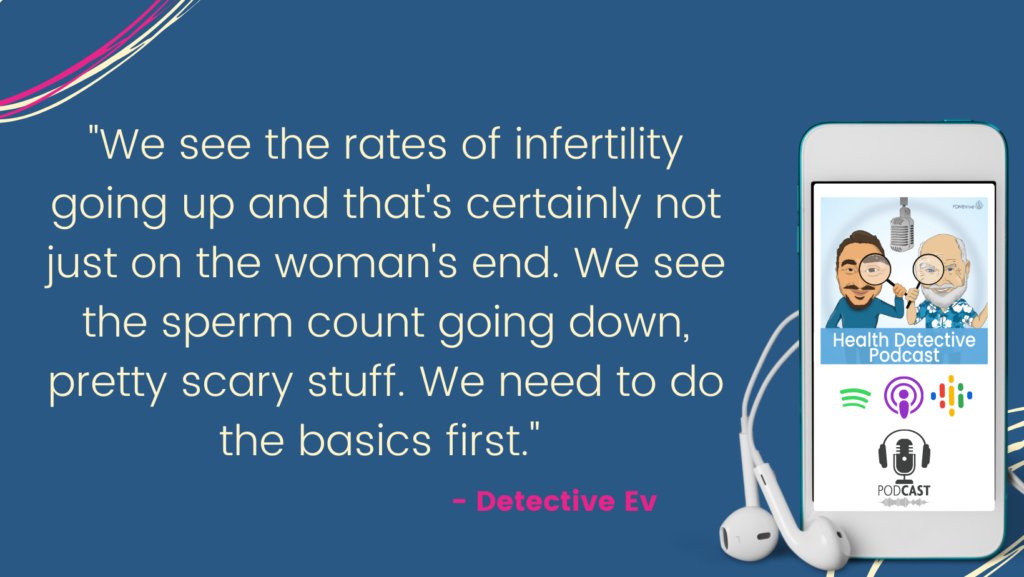
We see the rates of infertility going up and that’s certainly not just on the woman’s end. We see the sperm count going down, pretty scary stuff. We need to do the basics first, and that’s why it’s great to get fancy with the labs. Barbara can get extremely technical; she’s very well versed in this stuff.
And I will talk about your Instagram in a little bit, because she has great Instagram content that’s very simple, straight to the point, but you learn a lot. But the point is even without all the fancy stuff, you could get started today for free by just doing the basics. We’ve talked about it a million times on this show because the fundamental truth is your body wants to be healthy.
It does not want to be not having a period. It doesn’t want to be having a low sperm count. It’s doing these things because it feels like it needs to take away from these areas to help you survive. Now, you might not realize that you might not see it at the time, but that’s what it always is. The body’s genius. The body’s super intelligent.

It’s always doing the best thing for your survival, and it’s going to take away from those other areas when it feels like it needs to help you in the area of survival. It doesn’t make any sense to not be having a period. This is going to be the body’s response to chronic stress and the many things that are happening to us.
Barbara’s Target Client
I’m so glad that things are going in the right direction for you. I know this ended up turning into a huge passion for you where you ended up starting your own thing. Who do you work with now? What have you been inspired to take on? Because it’s not just people with anorexia, I’m assuming you’re working with a variety of different women.
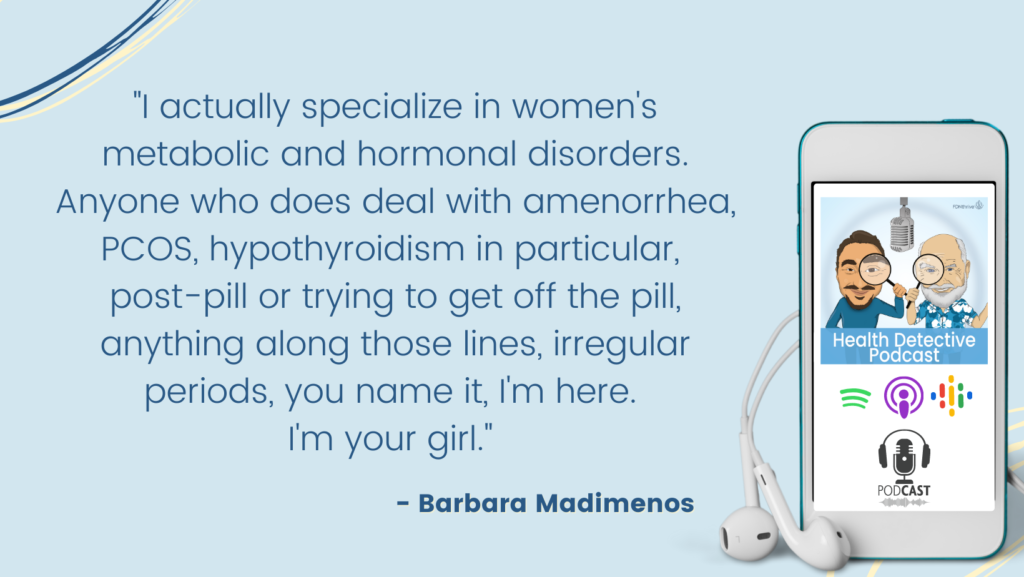
[00:31:08] Barbara: Yeah. I actually specialize in women’s metabolic and hormonal disorders. Anyone who does deal with amenorrhea, PCOS, hypothyroidism in particular, post-pill or trying to get off the pill, anything along those lines, irregular periods, you name it, I’m here. I’m your girl.
I really think it’s because so many of them intertwined without us even realizing the people, especially when it comes to diagnoses. I’m a really big believer that a diagnosis is just a name on an accumulative amount of symptoms. When really things could actually be a lot more similar than we actually give them credit.

So, I try to educate women on what is happening in their body and how they could support themselves independently and how to get to a place where they’re back to being metabolically sane, where they are able to become healthy again. If they do need any type of support, they could do it on their own through food and very minor supplementation and lifestyle modifications.
I’m here to educate first and foremost. I think that is the most empowering thing you could do for clients.
[00:32:19] Detective Ev: Yeah. This applies in so many categories, not even just in health. But I’ve never really thought elsewise. I’ve always wanted to educate myself, and you and I grew up in a generation that typically most of us had access to the internet from a pretty young age. We had the ability to go do our own research on things.
I can’t even imagine now, and I get why it happens, because many people don’t deal with health issues at a young age. But I can’t even imagine not knowing about my own body and knowing about health and that’s the majority of people, Barbara. They’re walking around and they have their own respective careers, completely unrelated to healthcare and they don’t know anything about this.
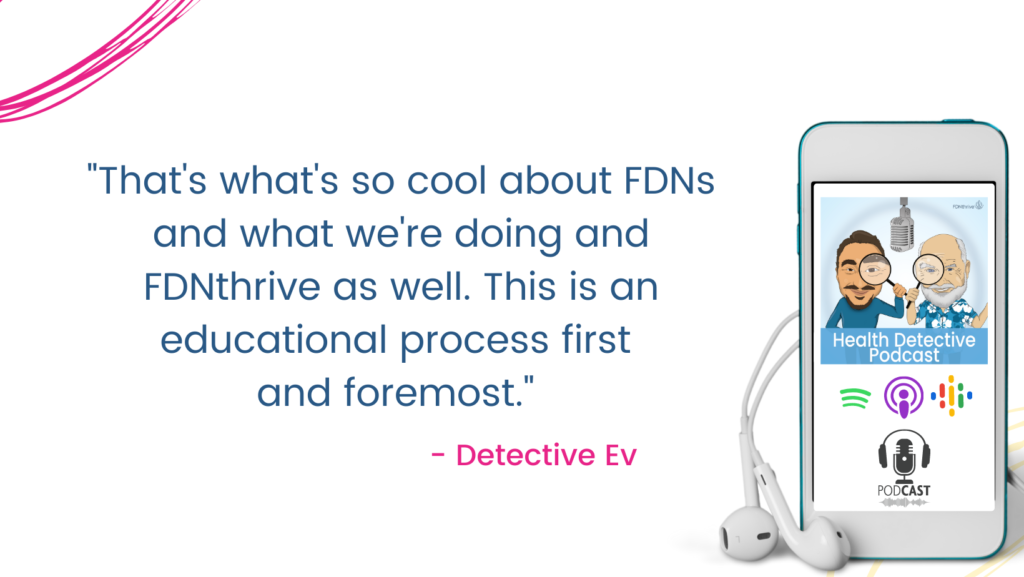
Then when they do get sick, they go rely on a health professional. I think that’s great. There’s a time for that. But that’s what’s so cool about FDNs and what we’re doing and FDNthrive as well. This is an educational process first and foremost, and you’re going to leave… knowing as much as an FDN? Probably not. We’re highly trained individuals. Are you going to understand why you’re doing what you’re doing and how you got to where you’re at? Yes. Unfortunately, as simple as that is, that is certainly more than can be said about most times when we go into the conventional healthcare system.

[00:33:24] Barbara: Yeah, a hundred percent. Usually you walk in, and I’m not trying to minimize the ability that any conventional health care practitioner can help you with, but their model of care is, what is your symptom? Here is maybe a pill or something for that particular symptom. No one’s asking, but why do you have that symptom and is it connected to your other symptoms?
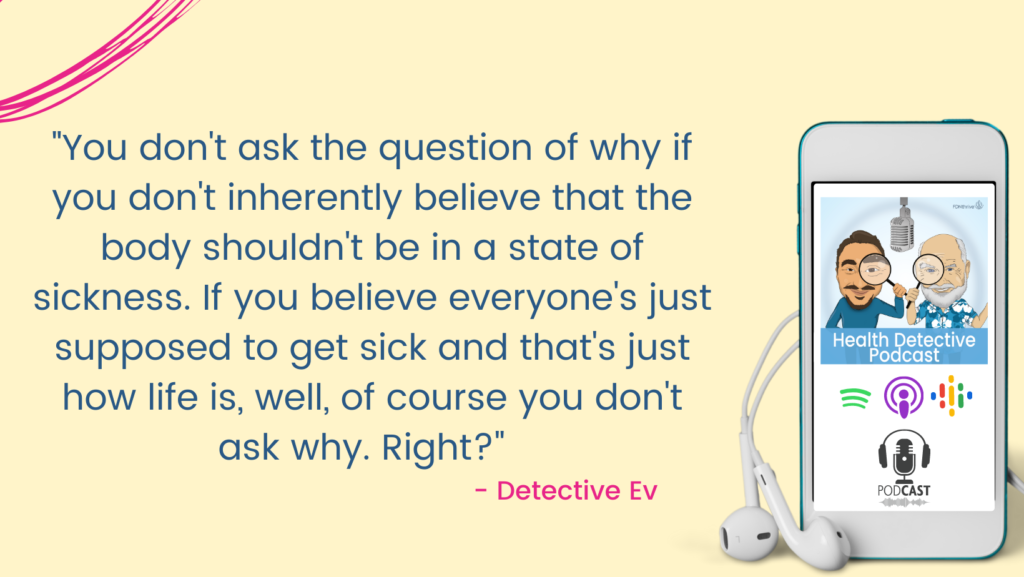
[00:33:46] Detective Ev: Yeah, it’s a simple question basically founded on the belief, I think it’s a very obvious belief in my opinion, that the body shouldn’t be sick, plain and simple, period. Because you don’t ask the question of why if you don’t inherently believe that the body shouldn’t be in a state of sickness. If you believe everyone’s just supposed to get sick and that’s just how life is, well, of course you don’t ask why. Right? We treat the symptom and then we give a medication. If that hasn’t worked, perhaps a surgery, if that’s relevant. And that’s just not the belief that we’re under. If you are not under that belief either, then you’re in the right place.
Client Successes
I know that we have to be careful about privacy and stuff like that, so the way that you’re able to do this, is there any like client successes that you’ve had so far that really stand out? It can be something simple. I always just like to show that this is a system that works for a wide variety of individuals. I’d be curious if someone came to you and they’re just like, you know what, Barbara, I relate to you totally. But I’ve had no results anywhere else. Then they came to you, and they got results.
Is there anyone that comes to mind, if I say it like that?
[00:34:42] Barbara: Yeah, well, I have two actually. I have one who is a current client and somebody who is not a current client. She will be signing up with me though in January. I’ll start off with my current client.

She has been dealing with infertility for years, years, years, years, years, years. She’s been on fertility treatments and all that. She ended up losing her period last year during the summer. Well, not last year, like this year during the summer. She came to me, and she just wanted her period back so she could at least hopefully try again for her second kid in the new year.
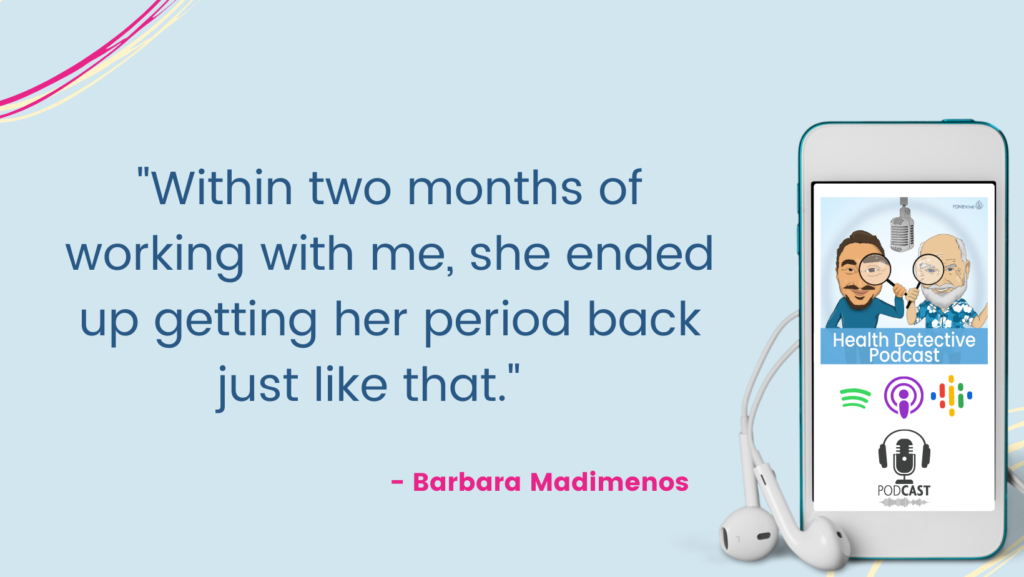
Within two months of working with me, she ended up getting her period back just like that. She was on a full stack of supplements. We really minimized it down to like three or four pills. We really cleaned up her diet, her sleep, and her exercise routine. I guess her body just really felt a lot safer where she was able to ovulate again and there we go, we got her period back.

She was over the moon happy because she knows just how important it is for the body to feel safe to then bear a child. You can’t bring a kid into this world without the body feeling safe enough and capable in supporting it. Cause then it’s two lives that it has to take care of.
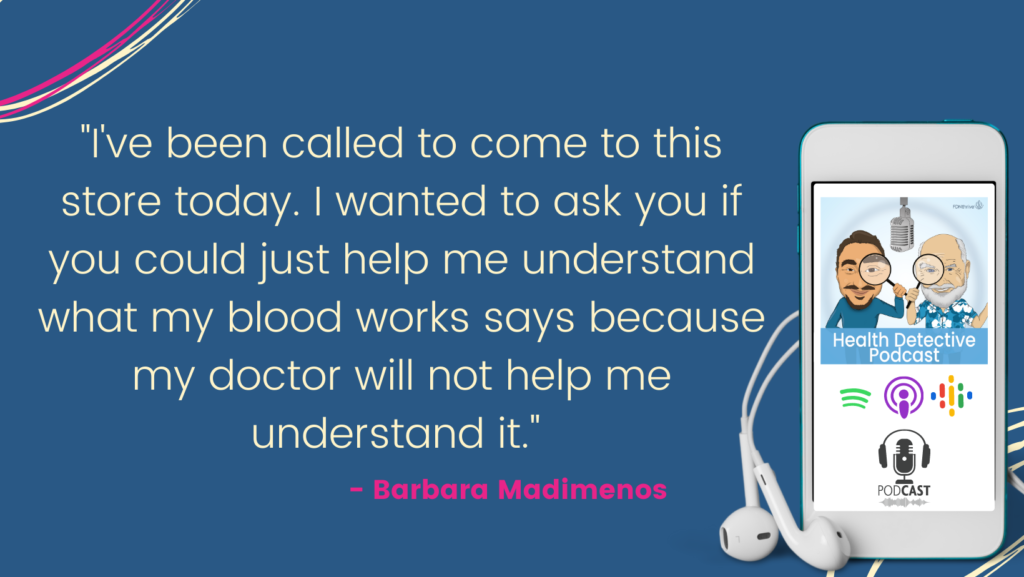
Then there was this other woman, because I also worked at a supplement store with some naturopaths and homeopaths. And I had a lady who came in and she literally brought an entire stack of her blood work. And she said, listen, I don’t know where else to go. I’ve been called to come to this store today. I don’t know what compelled her to do so. But she comes in, and she said, I wanted to ask you if you could just help me understand what my blood works says because my doctor will not help me understand it.
They’re telling me that it’s of no importance for me to understand, I’m not going to be able to get it. I went through the blood work with her, and I don’t quite remember what the marker was. It wasn’t a common blood marker that I saw, but she was dealing with extreme body pain and fatigue.

I looked up the marker very quickly. From what I gather, it was her cells had an inability to use and absorb glucose. Just from her symptoms that she was telling me, I immediately gave her a castor oil pack. I said, listen, just put this over your liver, because that is where most of your thyroid hormone is converted.
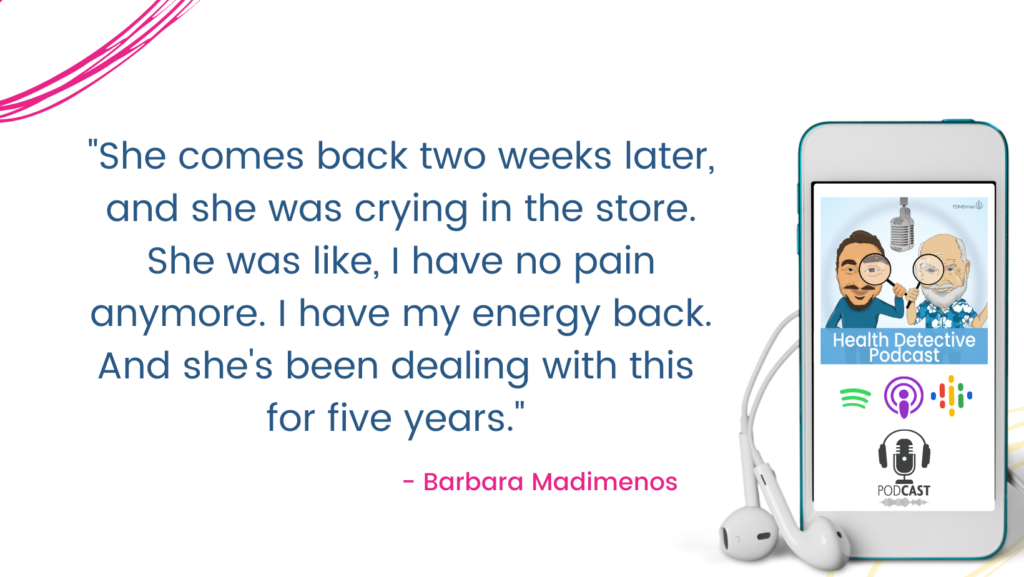
Do this for once a day for an hour for about one to two weeks. Maybe you’ll see a difference with your energy levels. She comes back two weeks later, and she was crying in the store. She was like, I have no pain anymore. I have my energy back. And she’s been dealing with this for five years.
And I was like, was it that easy? All I had to do was give you castor oil? Those little wins really make you feel good. I’m hoping to continue to help people like that as well for many more years.
[00:37:30] Detective Ev: That’s amazing. Yeah. It never gets old.
Because as people who’ve been through their own health issues, you understand, it’s just a whole different perspective on life, in my opinion, when you’ve dealt with this stuff. I don’t know if everyone has this, but I feel like most people on this show do. You just start to understand how limited the time here is and how I don’t want to be wasting any more time dealing with chronic health issues.
Then when you can give this gift to someone else, I mean, they’re coming into a supplements store with blood work for God’s sake. That’s sad. I don’t mean that against them, that’s not their fault. It’s just, that’s sad that that’s what they feel like they need to do.
I find it even more interesting that she worded it as she felt called to do that because let’s be dead honest, how many times are you going to walk into a supplement store and get someone as trained as you, behind the counter? That’s a hell of a statement to make, and I think that’s pretty cool. I’m totally into that stuff. I just find that very interesting that that worked out and hopefully it ends up being something even more as time goes on here.
I don’t want it to seem random, but I wanted to make sure I asked this specifically before we got off with the anorexia thing. Is there a piece of advice that you would give to anyone out there who is currently dealing with this, functional health, no functional health, that doesn’t even matter to me right now?
A Piece of Advice
This is a mental health condition that kills more people than any other mental health condition. So, I think this matters a lot of what piece of advice would you maybe give someone out there that’s suffering with it right now?
[00:38:53] Barbara: I think what’s really important is to remind yourself that you’re the only person who could really make the change if you really want to make it.

I had to learn the hard way that no one was going to be able to help me, even if I did seek out the help that I needed, to make the necessary changes to recover and get to a much better place. It’s very hard to muster that strength on your own.
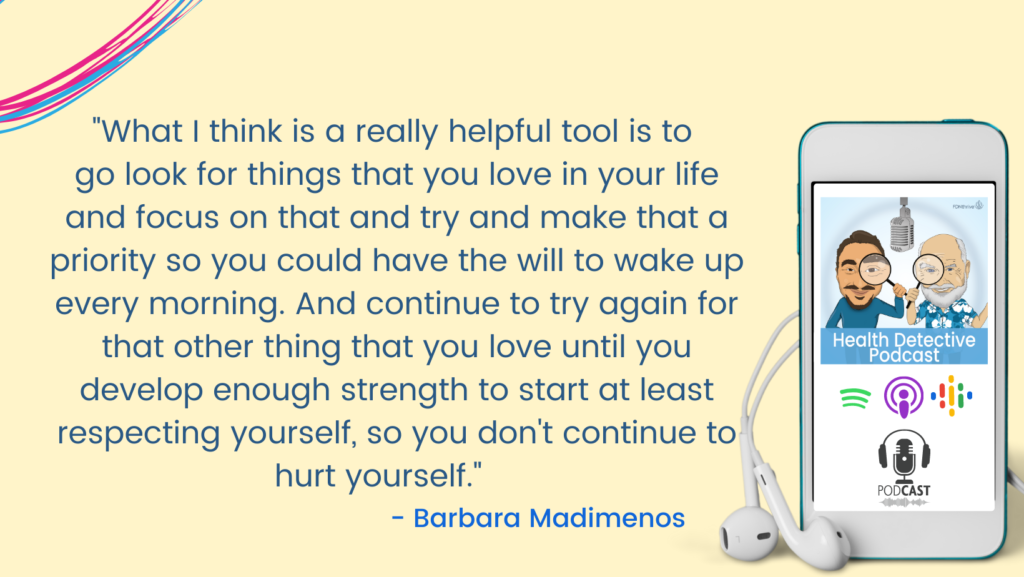
But what I really think the best way to put it is, don’t start with the intention of trying to love yourself because that’s not going to come easily. You’re not going to love yourself just like that. You’re not going to want to recover just like that either. What I think is a really helpful tool is to go look for things that you love in your life and focus on that and try and make that a priority so you could have the will to wake up every morning. And continue to try again for that other thing that you love until you develop enough strength to start at least respecting yourself, so you don’t continue to hurt yourself. I think is the best advice that I could have.
[00:40:01] Detective Ev: Awesome. That’s wonderful.
Thank you. Because it matters to get this out there for people and every physical health condition’s different, every mental health condition, especially in my opinion, is dramatically different from the next one. It helps to have someone that’s been through it, and it sounds like has overcome it either entirely or at the very least to the point that someone can go live a normal, productive life.
That’s what really matters, you know? I’m not under the belief yet that every mental health condition ever is a hundred percent curable or it’s going to go away completely. That’s okay. It doesn’t have to, because we can still learn to be productive members of society that have good lives and have otherwise normal lives, even with that. So that’s all that matters.

With the hormonal stuff, because now I feel like I’m jumping around a little bit, but we do have some extra time because I have two more questions at the end. But I want to make sure we get to this as well because I’m able to. With the hormonal stuff, I feel like this is such a huge topic. I’m not saying it’s not prevalent in men. I just think women, one, are more aware of it, and two, I do think it’s worse in women. I think there’s a variety of reasons for that. Namely that women are expected to use so many products and all this extra stuff that really just act as endocrine disruptors or affect people’s hormones.
There’s so much extra stuff with the makeup, the hair sprays, the shampoos or whatever. I’ve made this joke on the podcast before. I can go take a ten-minute shower and shave and I’m ready for the day. A female that was expected and to do all this extra stuff. It takes more time and there’s more products going into their skin and it’s absorbing and stuff. That’s always one of the reasons I think we’re having this huge hormonal issue.
But as someone who works with women who are having these types of issues, are there any like common themes that you’re seeing that maybe could be easy wins for these people?
Eat More, Not Less
What’s coming up over and over again, are they all type A people? Do they all use specific types of products? Are their diets a certain way? What’s a common theme that you’ve maybe noticed?
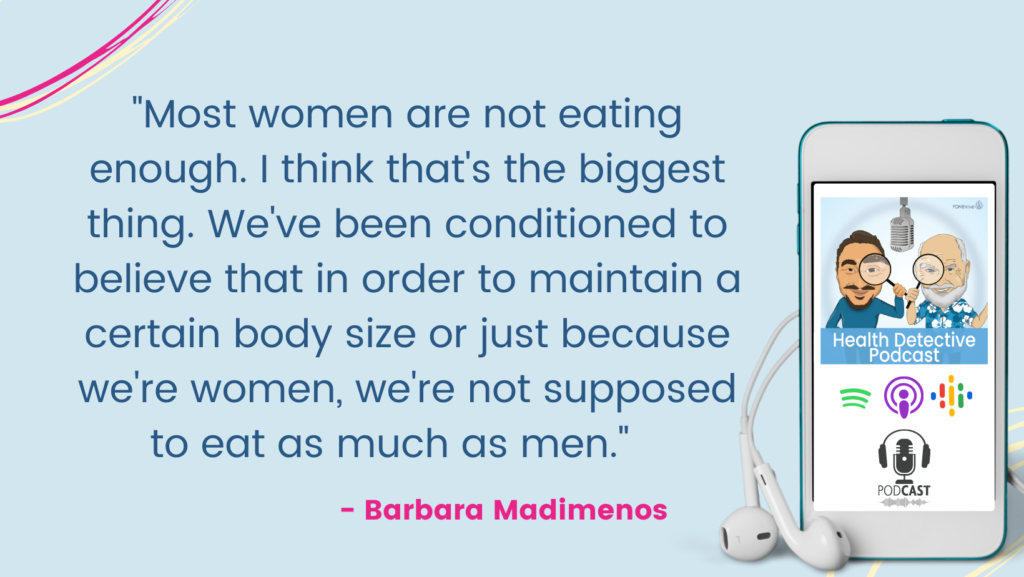
[00:41:44] Barbara: Most women are not eating enough. I think that’s the biggest thing. We’ve been conditioned to believe that in order to maintain a certain body size or just because we’re women, we’re not supposed to eat as much as men.
A lot of women are restricting themselves. Here’s an example. I’m working with a client right now. She sent me five days’ worth of calories because one of her goals is to lose weight. Her average was 1200 calories a day.

I was like, you are not going to lose weight on 1200 calories. We have to really rev up your metabolism and we have to get you up to 2000, because your body is starving. I think that’s a common theme and that will directly affect your hormones because your body is going to be in a fight or flight response. And it’s not going to have enough energy to allow yourself to ovulate or also work on digestion or to even remove toxins out of your body, or even maintain the hair on your head. It’s literally going to be in survival mode.
[00:42:50] Detective Ev: I feel like this is such a great message for people because it’s so counterintuitive. Everyone just hears calories in, calories out, and that’s what leads to weight loss or weight gain or whatever.
It’s just taken to the extreme and there are so many “well, buts,” “ifs” that go into those statements, and I never even realized how big the under eating in general, not even just anorexia, but just in general, was a problem for women, especially young women.
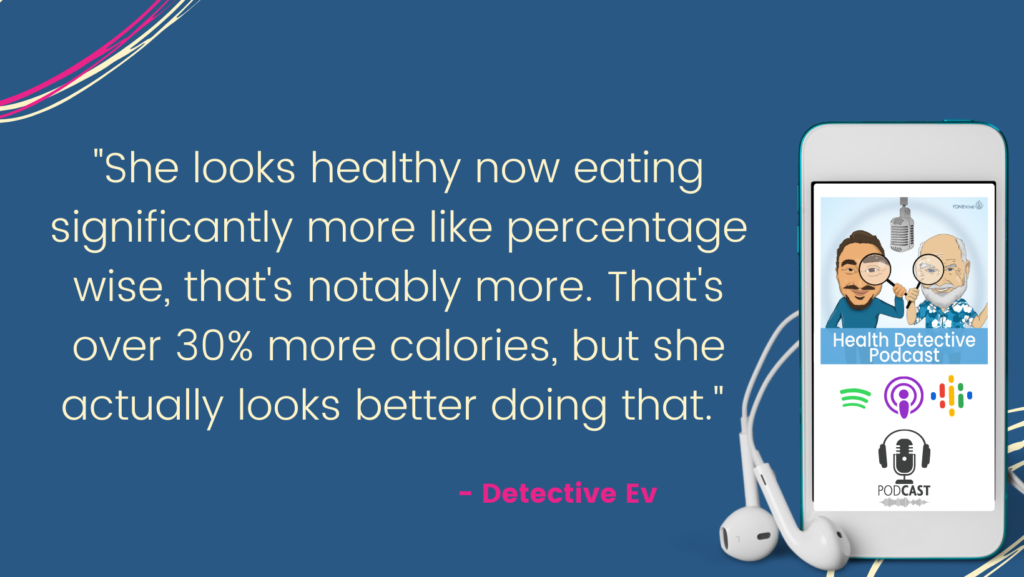
My friend Janell, she posts a lot about this, and she did not have an eating disorder, but she dealt with what she called disordered eating, and she fell for this. I actually think she posted the exact same number, believe it or not, it was around 1200 – 1300 calories. She shows the photos of when she was eating like that, versus when she was eating like 2000. Not that we want to be basing it just off body image in general anyway, but like Jenelle looks great. She looks healthy now eating significantly more like percentage wise, that’s notably more. That’s over 30% more calories, but she actually looks better doing that.

Yeah, guys, the body needs a certain amount of food. As funny as this sounds, but you know I’m a leaner person, I think unintentionally, I fell into this trap of not realizing how many calories I actually need. Especially, you and I are similar where we both just bounce off the walls and we’re doing a thousand things every single day, the body requires fuel for that. I don’t even think I’ve realized sometimes how much fuel’s required to go do that. There’s a huge stress from under eating.
There’s quite a few things I’ve learned from your post actually, like even the correlation between how exercise can be causing acne. I’m like, what the heck? Why would that happen? It’s not that you meant like, oh, well, it’s the sweating. It’s because it’s a stress on the body. I found that under times that I’m under a lot of stress, I’ll get a few breakouts here and there, which thankfully it never gets as bad as it used to be. It was traumatic at one point in my life.
But I’ve realized if I toned back down on the exercise, I literally just did this experiment recently based on one of your posts, I noticed like, wow, I’m actually doing less and I’m getting better health results, which I thought was totally cool and crazy.
Where to Find Barbara
That leads me to my second to last question. Where can people find you? Especially the Instagram, because there’s so many great tips out there that you’re posting all the time.

[00:44:48] Barbara: Yeah, they could find me on my Instagram, primarily at barbaramadimenos. I’m not sure if I should spell that, but it’s B A R B A R A M A D I M E N O S.
Or my website is currently under construction, but once it’s back up, it’s www.barbaramadimenos.ca.
[00:45:05] Detective Ev: Cool. I’ll make sure that is in the show notes for everyone.
Now, our final question on the Health Detective Podcast is one that’s kind of similar to the one that I asked about anorexia, but that was more just personal because I think that’s a useful thing for today while we have you on. This question is meant generally, you can answer it any way you like.
Barbara’s Magic Wand
And the question is, if we were able to give Barbara in this case, a magic wand, and you could get every single person in this world to do one thing for their health or get them to stop doing one thing, what is the one thing that you would get everyone to do?
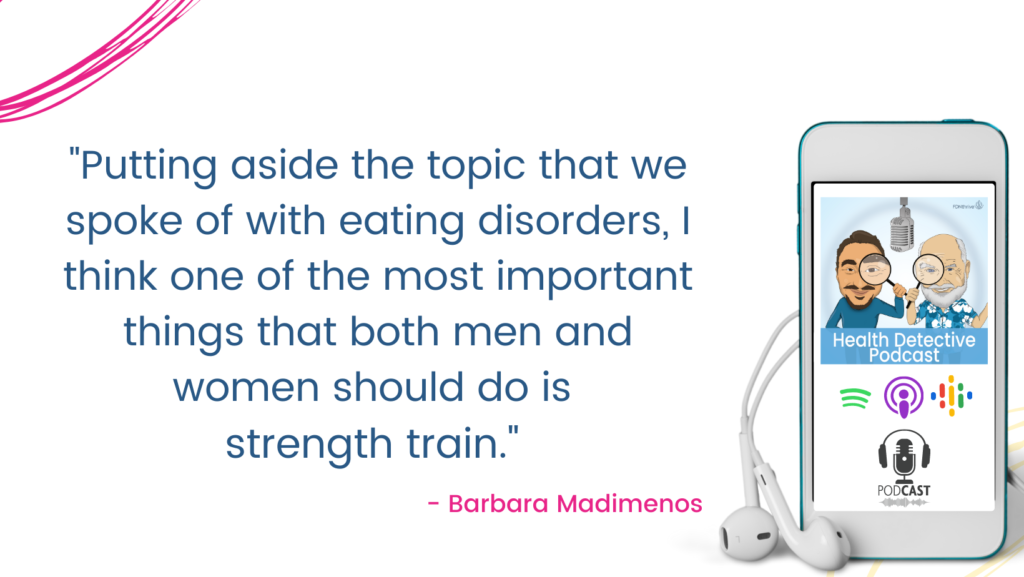
[00:45:39] Barbara: Oh my God. That’s so hard. If I’m going to speak of in general putting aside the topic that we spoke of, with eating disorders, I think one of the most important things that both men and women should do is strength train. Muscle is an endocrine organ. It is probably the most beneficial thing you could not just do for your physical health, but for your mental health as well.
Conclusion
[00:46:03] Detective Ev: What an awesome person, man! I have so much respect for anyone that comes on this podcast and shares what are most likely some of the darkest parts of their life and the hardest things that they’ve dealt with and they’re doing this selflessly.

Maybe yes, if they have a business, they get a client. That’s great. But at the end of the day, there’s no guarantee of that. They’re coming on to help other people. I find that stuff so amazing. So inspiring. Especially when it’s something with an issue as serious and as stigmatized as mental health. I think it just takes that much more courage to come on and do something like this.
So, Barbara, thank you so much for hopping on here and doing this with us. We love you, man. Well, woman. We’re just so glad to have you on.
Hey guys, we love you as well. We thank you for listening to another episode of the Health Detective Podcast by FDNthrive. As always, I’m your host, Evan Transue, AKA Detective Ev. If you like the information that we’re sharing, could you please be so kind as to leave us a five-star review on apple podcasts? And I just realized, I think I’m correct on this, that you can leave reviews on Spotify. If I am accurate in my statements, we’d love it if you left us a review or two there as well.
Thank you so much. We are looking forward to talking to you guys again soon. Take care.
[00:47:31] Announcer: Thanks for tuning into the Health Detective Podcast. If you are ready to finally work with a real health detective on your health journey so that you can get well and stay well naturally, visit us at fdnthrive.com and click the “Get Started Here” button.
